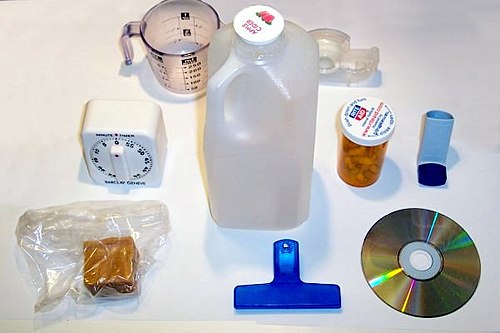Polypropylenenoun
A thermoplastic resin made by the polymerization of propylene, and used for films, fibres, or moulding materials. Also known as polypropene.
Polypropylenenoun
a polymer of propylene used as a thermoplastic molding material
Polypropylenenoun
a synthetic resin which is a polymer of propylene, used chiefly for films, fibres, or moulding materials
Polypropylene
Polypropylene (PP), also known as polypropene, is a thermoplastic polymer used in a wide variety of applications. It is produced via chain-growth polymerization from the monomer propylene.
Plasticnoun
A synthetic, solid, hydrocarbon-based polymer, whether thermoplastic or thermosetting.
Plasticnoun
Credit or debit cards used in place of cash to buy goods and services.
Plasticnoun
(slang) Fakeness, or a person who is fake or arrogant, or believes that they are better than the rest of the population.
Plasticnoun
(obsolete) A sculptor, moulder.
Plasticnoun
(archaic) Any solid but malleable substance.
Plasticadjective
Capable of being moulded; malleable, flexible, pliant.
Plasticadjective
Producing tissue.
Plasticadjective
(dated) Creative, formative.
Plasticadjective
(biology) Capable of adapting to varying conditions; characterized by environmental adaptability.
Plasticadjective
Of or pertaining to the inelastic, non-brittle, deformation of a material.
Plasticadjective
Made of plastic.
Plasticadjective
Inferior or not the real thing.
Plasticadjective
Fake.
Plasticadjective
Having the power to give form or fashion to a mass of matter; as, the plastic hand of the Creator.
Plasticadjective
Capable of being molded, formed, or modeled, as clay or plaster; - used also figuratively; as, the plastic mind of a child.
Plasticadjective
Pertaining or appropriate to, or characteristic of, molding or modeling; produced by, or appearing as if produced by, molding or modeling; - said of sculpture and the kindred arts, in distinction from painting and the graphic arts.
Plasticnoun
A substance composed predominantly of a synthetic organic high polymer capable of being cast or molded; many varieties of plastic are used to produce articles of commerce (after 1900). [MW10 gives origin of word as 1905]
Plasticnoun
generic name for certain synthetic or semisynthetic materials that can be molded or extruded into objects or films or filaments or used for making e.g. coatings and adhesives
Plasticadjective
used of the imagination;
Plasticadjective
capable of being molded or modeled (especially of earth or clay or other soft material);
Plasticadjective
capable of being influenced or formed;
Plasticnoun
a synthetic material made from a wide range of organic polymers such as polyethylene, PVC, nylon, etc., that can be moulded into shape while soft, and then set into a rigid or slightly elastic form
Plasticnoun
credit cards or other types of plastic card that can be used as money
Plasticadjective
made of plastic
Plasticadjective
not genuine; artificial or unnatural
Plasticadjective
(of a substance or material) easily shaped or moulded
Plasticadjective
offering scope for creativity
Plasticadjective
exhibiting adaptability to change or variety in the environment.
Plasticadjective
relating to moulding or modelling in three dimensions, or to produce three-dimensional effects
Plasticadjective
(in science and technology) relating to the permanent deformation of a solid without fracture by the temporary application of force.
Plastic
Plastics are a wide range of synthetic or semi-synthetic materials that use polymers as a main ingredient. Their plasticity makes it possible for plastics to be moulded, extruded or pressed into solid objects of various shapes.


















